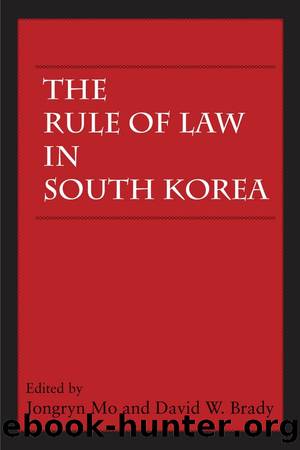The Rule of Law in South Korea by Jongryn Mo & David W. Brady

Author:Jongryn Mo & David W. Brady [Mo, Jongryn & Brady, David W.]
Language: eng
Format: epub
Tags: International Relations, Korea, Judicial Power, Political Science, Asia, History, Law Enforcement, Law, General
ISBN: 9780817948924
Google: IDcunwEACAAJ
Goodreads: 13211023
Publisher: Hoover Institution Press
Published: 2009-01-01T00:00:00+00:00
Depending on the values of these two variablesâthe political strength of the ruling party and the economic orientation of the business sectorâthere can be four analytically distinct types of political exchange (Figure 1). In the first case, business is politically vulnerable but economically independent, and the ruling party and business are expected to bargain on relatively equal footing. By contributing to a strong ruling party, business wants to make sure that the party will create or maintain a favorable business environment. But business would not be willing to contribute large amounts because the influence of the government is limited in a market-oriented economy.
When the ruling party is weak ahead of the election in a market-oriented economy, business would be very cautious about contributing to the ruling party, and if it doesn't, it would not offer much more than what it would give to the leading opposition party. In this uncertain environment, business would try to keep every contending political party at arm's length and hedge its bets by distributing its funds thinly across parties.3
The third type of political exchange occurs when a strong ruling party meets a government-dependent business sector. In this case, the ruling party with a preponderance of bargaining power can dictate the terms of exchange to the business. If the ruling party happens to have authoritarian tendencies, it can take the practice to an extreme form of predation. The level of illegal contributions will also be high. Not only can the ruling party demand more money, but also it can raise money separately through the president and the candidate. In an environment in which not even the president and the candidate are perfectly forthcoming to each other about their fund-raising activities, donors are not able to play one against the other; thus, they contribute separately to both of them, sometimes doubling the contribution amounts that they might have given to one recipient.
When a government-dependent business sector faces a weak ruling party, the business sector gets a chance to manage a government-business relationship on its terms. If business is successful in capturing the government after the election on the basis of campaign contributions, it can reap large economic benefits, so it would be willing to donate relatively large amounts of money to the ruling party. But since the ruling party is weak, it may not take much for the business sector to win desired concessions from the ruling party. Thus, the amount of contributions under this type of political exchange will stay in the medium range.
The simple framework of political exchange involving illegal corporate contributions suggests that there are two main routes, regulation and competition, to alleviating the problem of illegal donations (table 1).4 Regulation discourages illegal donations by increasing the expected cost of violations (the size of punishment times the probability of getting caught), whereas competition works on the supply side by lowering the expected benefit of donation (the size of the rent times the probability of the rent actually being delivered). If a country is currently
Download
This site does not store any files on its server. We only index and link to content provided by other sites. Please contact the content providers to delete copyright contents if any and email us, we'll remove relevant links or contents immediately.
| Comparative | Conflict of Laws |
| Customary | Gender & the Law |
| Judicial System | Jurisprudence |
| Natural Law | Non-US Legal Systems |
| Science & Technology |
American Kingpin by Nick Bilton(3878)
Future Crimes by Marc Goodman(3595)
The Meaning of the Library by unknow(2566)
Inside the Middle East by Avi Melamed(2352)
Why Nations Fail: The Origins of Power, Prosperity, and Poverty by Daron Acemoglu & James Robinson(2289)
On Tyranny by Timothy Snyder(2227)
Living Silence in Burma by Christina Fink(2068)
Putin's Labyrinth(2017)
The Mastermind by Evan Ratliff(1934)
The Smartest Kids in the World by Amanda Ripley(1855)
Think Like a Rocket Scientist by Ozan Varol(1815)
Law: A Very Short Introduction by Raymond Wacks(1741)
It's Our Turn to Eat by Michela Wrong(1729)
The Rule of Law by Bingham Tom(1691)
Philosophy of law a very short introduction by Raymond Wacks(1667)
Leadership by Doris Kearns Goodwin(1634)
A Dirty War by Anna Politkovskaya(1627)
Information and Communications Security by Jianying Zhou & Xiapu Luo & Qingni Shen & Zhen Xu(1617)
Civil Procedure (Aspen Casebooks) by Stephen C. Yeazell(1554)
